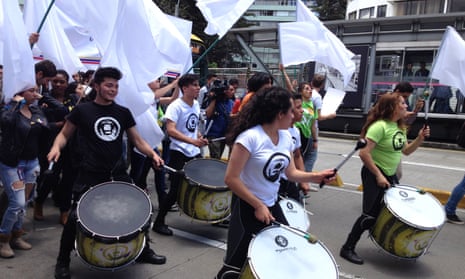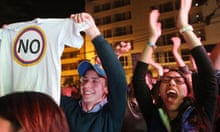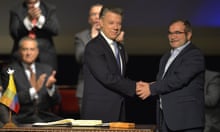Colombians will vote on Sunday on whether to approve a historic peace agreement signed by the country’s president, Juan Manuel Santos, and Timochenko, leader of the Revolutionary Armed Forces of Colombia (Farc). If, as polls predict, the yes vote wins, it could bring an end to a half-century war that killed a quarter of a million people.
We asked Colombians for their views on the peace deal, their experiences of living with the conflict and their hopes and fears for the future.
‘The victims will always be the most important part of any peace agreement’
Wenceslao, 23, Medellín
I was born eight hours [285km] from Medellín in a small town called Chigorodó, inside the Urabá zone. This part of the country lived through some of the crudest violence of the conflict between the Farc, the ELN and extinct ELP between 1988 and 2004. It is a big step forward to finally end the war with one of the longest standing guerrilla groups in the world, and I welcome the peace agreement with open arms because it is with inclusion and forgiveness that we become a better country.
I do find some flaws in the agreement, though, especially on victim reparation, which lacks forcefulness. The victims are, and always will be the most important part of any peace agreement, and they deserve honesty. I live in Medellín and am not surrounded by the same kind of conflict people from the countryside have been, and still are to some degree, but understand it’s a very complex subject. In some areas living with the Farc meant protection and even development – they built roads for places forgotten by the government, maybe not for totally altruistic reasons, but still.
I think we still have a long way to go and I’m afraid there is a big chance most people will vote no in the plebiscite. Many of my acquaintances, colleagues and even some friends don’t agree with the peace process because, to them, it’s a door to impunity and communism, taking us closer to becoming a second Venezuela. The process is by no means perfect, but it is our responsibility to grade it as objectively as possible, to become critics without hate, and to remove disinformation and lies from the debate.
‘I can still remember the fear in my mother’s eyes’
Manuel, 26, now in Bogotá
I was born in a small town in the Llanos region, a stronghold of the liberal guerrillas of the 50s. In the 90s, when I was a child, it was taken a couple of times by the Farc – we lived surrounded by violence.
I remember two events clearly: my mother throwing us to the floor to protect us from stray bullets (I still remember the fear in her eyes) when the Farc first took the town, and a couple years later being trapped on a farm we were visiting when they were engaged in combat with paramilitaries really close by. When we were finally able to return to the town everybody thought we had been killed; those days the paramilitary moved and killed as they wished. Even my dog was shot one night.
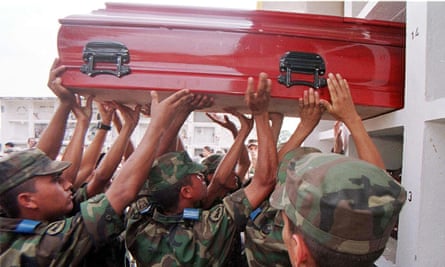
My family have been lucky enough not to be direct victims, but I had a classmate whose father was killed when paramilitaries drove a car over his chest. Our maid had a small farm with cows. When they did not pay the tax, her husband was killed in front of their house.
We got used to it, we lost all empathy. For us a massacre in one faraway town was like a weather report, just routine. I don’t live there anymore, nor do my family, but I have experienced directly what many in the big cities haven’t. That lack of experience is why some of them don’t care.
The agreement is not going to end the conflict; we still have different agents in play here and I am really worried about violent rightwing groups. It is also hard to believe that suddenly everything in rural areas is going to be peaceful and safe without investment in infrastructure and basic services. I’m sceptical about the future, but ultimately we have nothing to lose in trying this approach.
‘I want peace but not at this cost’
Anonymous, 55, Cali
I feel angry and heartbroken because I know this is a way for the Farc to be free from punishment. They were so close to being defeated because of the policies of former president Álvaro Uribe and I believe this was why they decided to go in for peace talks. I worry that because they are so wealthy through drug trafficking, the Farc will have enough money to campaign and get into power.
We have survived 52 years of civil war, and we are a country of positive and hard-working people. Why should we have to let the Farc criminals free while normal Colombians who are in prison for minor crimes have to serve many years? The drug dealers and terrorists of the Farc are being paid and praised like Hollywood stars for all the crimes they have committed against humanity.
My family feels very insecure because our location is going to see an increase of guerrillas living in our areas; I don’t have hope for Colombia. Criminals will always be criminals, the only difference is that now they are white-collar criminals. We need to renegotiate the deal on offer. I want peace but not at this cost.
‘We love our country more than we hate Farc’
Jorge Patiño, 39, Bogotá

I feel optimistic about our future. No peace deal is perfect anywhere. Justice – in the traditional sense – is next to impossible, but it can be achieved in different ways. We’re amputating Farc’s armed hand through negotiation, not violence, and that’s no small feat. Now, they’ll have to learn how to use their non-shooting hand to do things peacefully.
We’ll also have to take proper care of the victims and give them the respect and truth they deserve, though – that is also part of justice.
We don’t like the Farc, not one bit, but we love our country more than we hate them and, for the sake of Colombia, we’ll give them the chance to act according to the law. We need to relearn as a society how to live with them and they’ll have to learn how to live under the rule of law. The biggest challenge of all will be a cultural one. We have to change our mindset from one of fear and anger to one of planning, caring, listening and forgiving.
‘We have a long way to go, but still, I am hopeful’
María-Victoria Mejía, 72, near the town of Paipa, Boyacá
I live on a small farm in central Colombia. I shall not be around by the time changes we expect from the peace process become real, but I am hopeful younger generations will do their best to get the most out of the chances they have for a better tomorrow. I hope they commit to successful implementation of all that is spelled out in the agreements.
Things shall only change, though, when political leaders, the business sector, the legal system, etc, change their ways – when corruption, exploitation of others and the lack of opportunities are obliterated from everyday life. There is no doubt things shall still be rough in the near future, for 25 years, at least. There are so few opportunities for poor people to get educated, to get out of poverty, to be treated as equals by their fellow citizens, to not be discriminated against on account of their race, colour or place in the society. We have a long way to go, but still, I am hopeful.
‘The real victims are showing us how forgiveness can change a country’
Juan, 29, now living in Scotland
I am not only happy, but proud. When I left Colombia to study abroad peace talks were just beginning and I was listening to the same old rhetoric from the Farc, leaving not much space for hope of a successful deal in the future.
Today, the situation is completely different. The peace negotiations have been able to tackle some of the most endemic problems of Colombian society, and have also opened the door for a bright future in which we can start thinking about the real problems of a developing country rather than spending most of our time and thoughts on war. This opens opportunities for rural areas, but also for urban citizens who might develop businesses based on the strengths of Colombia’s rich nature and diverse landscapes.
I think civil society and also the newly incorporated former guerrillas will take some time to accommodate to this new reality. However, the biggest challenge is for politicians to react to a country that wants to leave war behind and focus on developing the best conditions for its people.
I have been very fortunate to live a life that has not been directly affected by war, and it seems to be that some other people in my position are the ones opposing the peace agreement. The real victims on the other hand are promoting the yes vote and showing us how forgiveness can change a country.
‘We shouldn’t have to explain to our children why we are killing each other’
Juan, 26, Bogotá
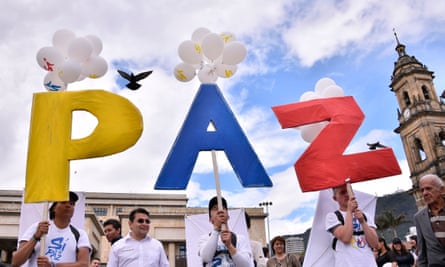
Today I live in Bogotá, but I’m originally from a smaller city, Cali. The peace deal represents the hope for me and my people that we may finally be able to break from the horrors of our past, and be able to move forward as a single, united and peaceful nation.
I strongly support the deal, even if it is not perfect. We have already suffered enough. Since I was a child, I remember the fear whenever we took a road trip with my family anywhere. Going outside the city, even 5km outside, was always a tense and fearful situation. There was always a risk that the Farc would have a surprise roadblock, and they could kidnap people. In my school a student from the year above me was kidnapped from the school bus.
The war also allowed criminals to exploit the fear of people. They often pretended to be Farc members and demanded money: my father received one of those calls. I remember the day my father told me – I was roughly 15 and remember sitting in the living room, scared for him, afraid afterwards that every time he went to work something could happen.
The peace deal for me, my friends and my family means that we no longer have to try to explain our children and adolescents why we are killing each other. Children will no longer have to grow up learning and praying not to have one of their parents or brothers or sisters kidnapped or killed in a senseless inner conflict.
Hatred and bigotry has become rampant, especially in the last few months building up to the vote. We need to rebuild our social fabric and to learn to understand each other.
‘Santos is only thinking about a Nobel prize’
Salua, 32
I believe Santos made this deal thinking of his ego and the Nobel prize. He does not care how he gets an agreement, or what the terms are, or how much money he needs to spend to get people to approve it – he just wants to be the president that signed the deal for peace. I also believe he has lied to our country, about the terms and about, for instance, places in congress for the Farc, where I fear they will influence voting with violence.
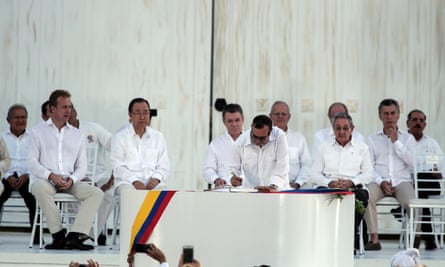
My hopes? For real peace, to extradite heads of guerilla groups to the US for at least 20 years. I also hope the UN steps in and blocks the peace agreement.
We Colombians are very idealistic; we believe in hope and romance, and we are in some sense naive. But, right now I feel sad, impotent and worried. Our institutions are drowned in a sea of corruption, and we are being so woefully accepting that the end justifies the means.
‘It isn’t a solution, it is a step toward a solution’
William Corcoro, 50, Bogotá
It can only be a step in the right direction, whatever the motives behind its various players. To reject it as a poor solution is an error – it isn’t a solution, it is a step toward a solution, a very important and crucial step.
I hope this will lead to greater de-urbanisation in Colombia. So many people are unhappy to be living in cities. Colombians need to re-inhabit our own country, to go back to rural areas. So many feel like shipwrecked castaways here in Bogotá. The landgrab era will end and peace will return, just as it has in most nations of the world before now.
